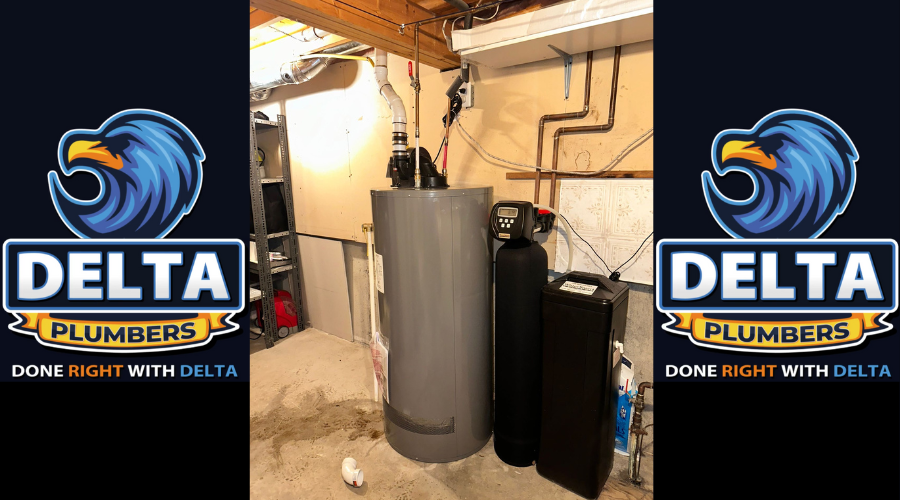When your water heater stops working, it can disrupt your daily routine, leaving you without hot water for showers, laundry, and other essential tasks. In these situations, you might face a dilemma: should you repair your water heater or replace it entirely? Understanding the factors that go into this decision can save you time, money, and stress.
In this blog, we’ll explore the key differences between water heater repair and replacement, helping you determine the best option for your home. From age and condition to energy efficiency and repair costs, we’ll walk you through the factors to consider when making your decision.

Picture Source – Delta Plumbers
Understanding Water Heater Repair
Water heater repair refers to fixing specific issues with an existing unit without replacing the entire system. Repairs can address a variety of problems, including thermostat malfunctions, faulty heating elements, sediment buildup, or a broken valve. If the issue is minor and the unit is still relatively new or in good condition, a repair can restore the functionality of the water heater for a fraction of the cost of a replacement.
Common Water Heater Issues That Can Be Repaired:
- Thermostat issues: If your water heater isn’t heating the water to the right temperature, it could be a problem with the thermostat.
- Heating element failure: In electric water heaters, a faulty heating element may need replacing.
- Sediment buildup: Mineral deposits can accumulate in the tank, affecting the efficiency of the heater.
- Leaking tank: Small leaks may be repaired with seals or pressure relief valve replacement.
Repairs can extend the life of your water heater for several more years, making them a great option for those on a budget or with newer units that have relatively low wear and tear.
Also Read: Why Ontario Homes Need Special Plumbing Care

Picture Source – Delta Plumbers
When Should You Repair Your Water Heater?
While some problems can be repaired quickly and affordably, there are certain situations where repairing your water heater makes more sense than replacing it. You should consider repair if:
- The unit is less than 10 years old: If your water heater is still relatively young, a repair may restore it to working order and keep it running for several more years.
- The repair is inexpensive: If the cost of the repair is low and the issue is straightforward (e.g., replacing a thermostat or heating element), it may be worth repairing rather than replacing.
- The issue is isolated: If there is a specific, isolated issue like a broken valve or a malfunctioning thermostat, repairing the part may be the most cost-effective option.
In these cases, repair may be the better option, as it’s more affordable and less disruptive than replacing the entire system.
Also Read: The History of Canadian Plumbing: From Ancient Rome to Modern Homes

Picture Source – Delta Plumbers
Understanding Water Heater Replacement
Water heater replacement involves removing your existing unit and installing a completely new one. While this option comes with a higher upfront cost, it offers long-term benefits. If your water heater is too old or has multiple issues, a replacement might be necessary to avoid constant repairs or higher energy bills.
When to Consider Replacing Your Water Heater:
- The tank is over 10-15 years old: Water heaters have an average lifespan of 10-15 years. If yours is approaching or exceeding this age, it may be more cost-effective to replace the unit than continue repairing it.
- The unit requires frequent repairs: If you’ve had to repair your water heater multiple times in a short period, it may be more cost-effective to replace it rather than keep paying for repairs.
- The tank is leaking: If your water heater’s tank is leaking or showing signs of corrosion, it may be a sign that the tank is failing. In this case, a replacement is the best option, as a leaking tank can lead to further damage.
Replacing a water heater provides the opportunity to upgrade to a more energy-efficient model, which can reduce your monthly utility bills over time.
Also Read: Top 5 Plumbing Issues in Older Homes (and How to Address Them)

Picture Source – Delta Plumbers
Signs That It’s Time to Replace Your Water Heater
Some indicators point to the need for a water heater replacement. These include:
- No hot water or inconsistent heating: If your water heater can’t produce enough hot water or the water temperature fluctuates, it may be time to replace it. This could indicate a problem with the heating elements, thermostat, or tank itself.
- Rusty or discoloured water: If the hot water coming from your faucet is rusty or discoloured, it could be a sign of corrosion inside the tank. In many cases, this means the tank is deteriorating and will need to be replaced.
- Strange noises: Rumbling or popping noises coming from the water heater usually indicate a buildup of sediment at the bottom of the tank. While this can sometimes be repaired, excessive sediment buildup can cause lasting damage, necessitating a replacement.
- Frequent breakdowns: If your water heater has needed frequent repairs over the last year or two, it may be time to replace it. Continuing to pay for repairs can add up quickly, making replacement a more cost-effective option in the long run.
If any of these signs apply to your water heater, it’s worth consulting with a professional plumber to determine whether a repair or replacement is the best course of action.
Also Read: How to Detect and Fix Hidden Water Leaks in Your Home

Picture Source – Delta Plumbers
Cost Considerations: Repair vs. Replacement
Cost is often the deciding factor for homeowners when deciding between repair and replacement. While repairs are typically less expensive in the short term, they can add up if your water heater continues to break down. On the other hand, replacing a water heater can be a significant investment upfront, but it may pay off over time through reduced energy costs and fewer repairs.
Here’s a breakdown of the costs:
- Water Heater Repair: The cost of a repair can range from $100 to $600 depending on the issue, the type of water heater, and labour costs. Minor repairs, like replacing a thermostat or heating element, are usually on the lower end of the spectrum.
- Water Heater Replacement: The cost of replacing a water heater ranges from $1,000 to $4,500 or more, depending on the type of water heater (tank or tankless), the size, and installation fees. While the initial cost is higher, replacing an old, inefficient unit with a new one can save you money on energy bills in the long run.
Also Read: Tankless Water Heater: Why You Should Upgrade

Picture Source – Delta Plumbers
Energy Efficiency: Repairing vs. Replacing
Energy efficiency is another important factor to consider when deciding whether to repair or replace your water heater. Older units are often much less efficient than newer models, which can drive up your utility bills. If your water heater is outdated and needs frequent repairs, replacing it with a more energy-efficient model may be the best choice.
Benefits of a New, Energy-Efficient Water Heater:
- Lower energy bills: Modern water heaters are designed to increase energy efficiency, helping you save money on your monthly utility bills.
- Environmentally friendly: Energy-efficient models use less energy, reducing your home’s carbon footprint and environmental impact.
- Long-term savings: While the initial cost of a new water heater is higher, the long-term savings on energy bills can make up for the upfront expense.
If your existing water heater is outdated and inefficient, replacing it can save you money and benefit the environment.
Also Read: Routine Drain Cleaning: Why it is Essential for Your Home.

Picture Source – Delta Plumbers
Making the Right Choice: Consult a Professional
Deciding whether to repair or replace your water heater can be difficult, especially when you want to balance the costs with long-term efficiency. The best way to make the right decision is to consult with a professional plumber who can assess the condition of your water heater and help you weigh the pros and cons of each option. A plumber can inspect the system, evaluate the cost of repairs, and provide a detailed recommendation on whether repair or replacement is the most cost-effective and reliable solution for your home.
Conclusion
Ultimately, whether you repair or replace your water heater depends on the unit’s age, condition, and the specific issue at hand. While repairs can be cost-effective for minor issues, replacing an old or inefficient unit can offer long-term savings and peace of mind. By understanding the factors involved and consulting with a plumbing professional, you can make the best decision for your home and your budget.









